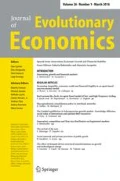Abstract
The notion of present value is an integral part of economics. So far, however, its rationale rests upon the well-known neoclassical assumptions of complete information and perfect rationality. The present value derives as the result of a calculation that requires the knowledge of the discount rate and the future returns of the evaluated assets. This paper presents a laboratory experiment that demonstrates that the present value of assets can also be discovered by participants of a production process endowed with incomplete information. The knowledge concerning future returns is not given to any one, but dispersed among the participants who, in addition, have no idea of their position in the production chain. In accordance with Hayek’s theory of the market process as a discovery procedure, the present value is found without any one subject being able to determine it individually.


Similar content being viewed by others
References
Ackert LF, Charupat N, Church BK, Deaves R (2006) Margin, short selling, and lotteries in experimental asset markets. South Econ J 73(2):419–436
Dimand RW, Geanakoplos J (2005) Celebrating Irving Fisher: the legacy of a great economist. Am J Econ Sociol 64(1):3–18
Fischbacher U (2007) Z-tree: Zurich toolbox for ready-made economic experiments. Exp Econ 10(2):171–178
Fischbacher U, Hens T, Zeisberger S (2013) The impact of monetary policy on stock market bubbles and trading behavior: evidence from the lab. J Econ Dyn Contr 37(10):2104–2122
Fisher I (1930) The theory of interest. MacMillan, New York
Forsythe R, Palfrey TR, Plott CR (1982) Asset valuation in an experimental market. Econometrica 50(3):537–567
Hayek FA (1937) Economics and knowledge. Economica, new Series 4(13):33–54
Hayek FA (1941) The pure theory of Capital. MacMillan, London
Hayek FA (1945) The use of knowledge in society. Am Econ rev 35(4):519–530
Huerta de Soto J (2012) Money, Bank credit, and economic cycles. Mises Institute, Auburn
Kirzner IM (1992) The meaning of market process. Routledge, London and New York
Lindahl E (1939) Studies in the theory of money and Capital. Allen & Unwin, London
Nelson RR, Winter SG (1982) An evolutionary theory of economic change. Harvard University Press, Cambridge and London
Palan S (2013) A review of bubbles and crashes in experimental asset markets. J Econ Surv 27(3):570–588
Selten R, Neugebauer T (2012) Forecasting security prices in experimental call-auction and double-auction markets, working paper
Smith VL (2003) Constructivist and ecological rationality in economics. Am Econ rev 93(3):465–508
Smith VL (2005) Behavioral economics research and the foundations of economics. J Socio-Econ 34:135–150
Smith VL (2008) Rationality in economics. Cambridge University Press, Constructivist and Ecological Forms. Cambridge et al.
Smith VL, Suchanek GL, Williams AW (1988) Bubbles, crashes, and endogenous expectations in experimental spot asset markets. Econometrica 56(5):1119–1151
Tobin J (1978) Monetary policies and the economy: the transmission mechanism. South Econ J 44(3):421–431
Tobin J (2005) Fisher’s “the nature of Capital and income”. Am J Econ Sociol 64(1):207–214
Vickrey W (1961) Counterspeculation, auctions, and competitive sealed tenders. J Financ 16(1):8–37
Acknowledgements
We thank Professor Mathias Erlei and the Institute of Management and Economics at the Clausthal University of Technology for providing us with the infrastructure necessary for our experiment. We further thank Professor Mathias Erlei and our colleague Jens Weghake for helpful comments on an earlier draft of this paper. We also profited from discussions with several participants of the “Clausthaler Ökonomisches Oberseminar” and the 2014 annual meeting of the “Gesellschaft für experimentelle Wirtschaftsforschung e.V.”
Author information
Authors and Affiliations
Corresponding author
Ethics declarations
Conflict of interest
The authors declare that they have no conflict of interest.
Additional information
Statement of data availability
The datasets analysed during the current study are available from the corresponding author on reasonable request.
Electronic supplementary material
ESM 1
(DOCX 119 kb)
Rights and permissions
About this article
Cite this article
Braun, E., Roß, W. The market process of capitalization: a laboratory experiment on the effectiveness of private information. J Evol Econ 28, 951–960 (2018). https://doi.org/10.1007/s00191-017-0508-6
Published:
Issue Date:
DOI: https://doi.org/10.1007/s00191-017-0508-6




